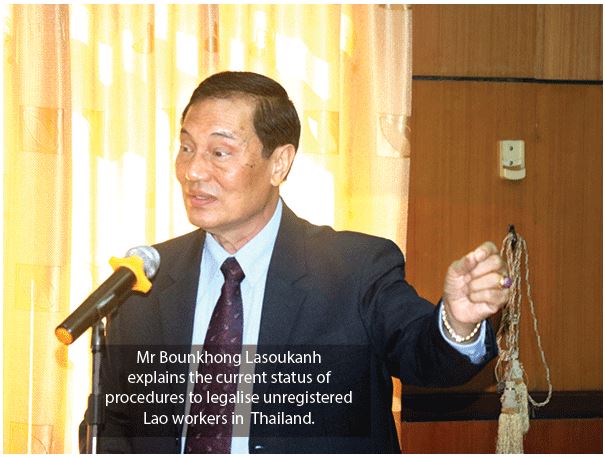Govt struggles to legalise Lao workers in Thailand
Labour authorities will continue to work with their Thai counterparts to complete the registration of Lao nationals currently working illegally in Thailand.
It is hoped the process can be completed next year, but some bureaucratic challenges have arisen.
A meeting was held on Friday to discuss the current status of the legalisation process, and was attended by Minister of Labour and Social Welfare Dr Khampheng Saysompheng and representatives of employment agencies in Laos.
A report on the situation was delivered by the Deputy Minister of Labour and Social Welfare, Mr Bounkhong Lasoukanh.
The report indicated that last year the Thai government promised to help with the confirmation of nationality of Lao workers, as part of the legalisation process.
But progress had stalled because the Thai government had changed the policy regarding the status of nationals from Laos, Cambodia and Myanmar.
There is now some confusion among Lao government officials as to whether the process should be carried out in line with the original Memorandum of Understanding or Thailand’s new policy.
Mr Bounkhong said Laos will continue to help register, confirm the nationality of, and provide assistance for Lao workers who do not have legal documentation in Thailand.
This is part of efforts to uphold workers’ rights and ensure they are not mistreated.
For several years, Lao workers in Thailand have not received protection under Thai law because they have not been properly registered, Mr Bounkhong said.
The Thai government had issued pink cards for foreign workers without full documentation as an interim measure under the agreement between Laos and Thailand to legalise the status of Lao workers, he added.
This gives workers time to apply for the necessary documents, including a work permit and visa, as well as a passport after confirming their nationality with their country of origin.
Thailand has also set up assistance centres in all of its provinces to register Lao workers who can prove their identity.
Mr Bounkhong said the previous agreement reached by Lao and Thai authorities was not going to plan because of the change in the Thai government’s policy regarding workers from Laos, Cambodia and Myanmar.
Some 158,000 Lao nationals are currently working in Thailand but only 71,000 hold work permits and can be considered to be legally employed.
Most work in hotels and restaurants, industry, agriculture and fisheries.
It is essential that Lao workers have full legal documentation in Thailand, so that their status is ensured and their position is recognised.
According to the Ministry of Labour and Social Welfare, some 71,000 Lao workers in Thailand who hold purple cards (work permits) have still not proven their identity.
Lao workers account for about 10 percent of the 1.5 million casual labourers from Laos, Cambodia and Myanmar who are employed in Thailand.
Source: http://www.vientianetimes.org.la/freeContent/FreeConten_Govt_271.php


 Thailand
Thailand




